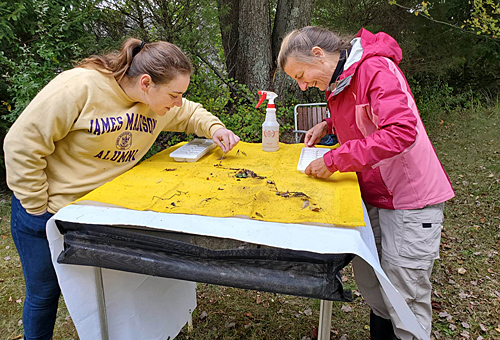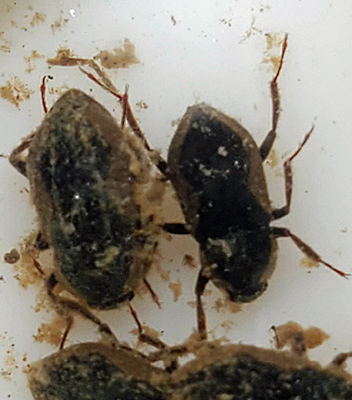Under overcast skies and chilly temperatures in early October, Stream Team volunteers Emily Maltman, Susan Schuler and Amy Ulland conducted two back-to-back benthic macroinvertebrate surveys at an unnamed tributary of Limestone Branch at JK Black Oak Wildlife Sanctuary. Located at the northern and southern ends of the property about a quarter mile apart, these sites are also respectively upstream and downstream from a malfunctioning wastewater treatment facility.

Emily Maltman and Susan Schuler look for macros upstream.
Photo by Amy Ulland
The upstream site received a score of 7 out of 12, indicating unacceptable ecological conditions. This was a decline from the acceptable ecological conditions score of 10 in the spring. A possible explanation for this decline in the stream’s health is that for about a week in August the stream ran dry, which could have resulted in the demise of some of the more sensitive macro populations living there.
Over 70 percent of the 391 macros collected at the upstream site were pollution-sensitive beetles, including water pennies and both larval and adult riffle beetles. About 12 percent of the sample consisted of pollution-tolerant worms. Smaller numbers of mayflies, caddisflies, midges, scuds and lunged snails were also present in the sample.
The downstream site received a score of 2 out of 12, indicating unacceptable ecological conditions – which is lower than the previous unacceptable ecological conditions score of 5. This site is less than 1/8 mile below a malfunctioning wastewater treatment facility, which was discharging visible amounts of sewage solids into the stream earlier in the year. The Environmental Protection Agency has mandated that the owners install a new wastewater treatment facility, so hopefully the ecological conditions of this stream segment will improve in the future.

Two of the many riffle beetles found upstream.
Photo by Amy Ulland
After sampling the maximum of four collection nets allowed by Virginia Save Our Streams protocol, only 138 macros were collected at the downstream site – less than the 200 minimum required by the protocol. These macros included mostly midges, leeches, lunged snails, flat worms – all pollution-tolerant organisms.
Both of these sites are also part of Loudoun Wildlife’s Clean Drinking Water for Lucketts project funded by the Tides Foundation, on the recommendation of the Google Data Centers Grant Funds. You can find more information about both benthic and E. coli data on the Lucketts Water Quality Monitoring Sites page.
Please Note: To protect the environmentally sensitive habitat and rare species, JK Black Oak Wildlife Sanctuary is not open for general public access.

